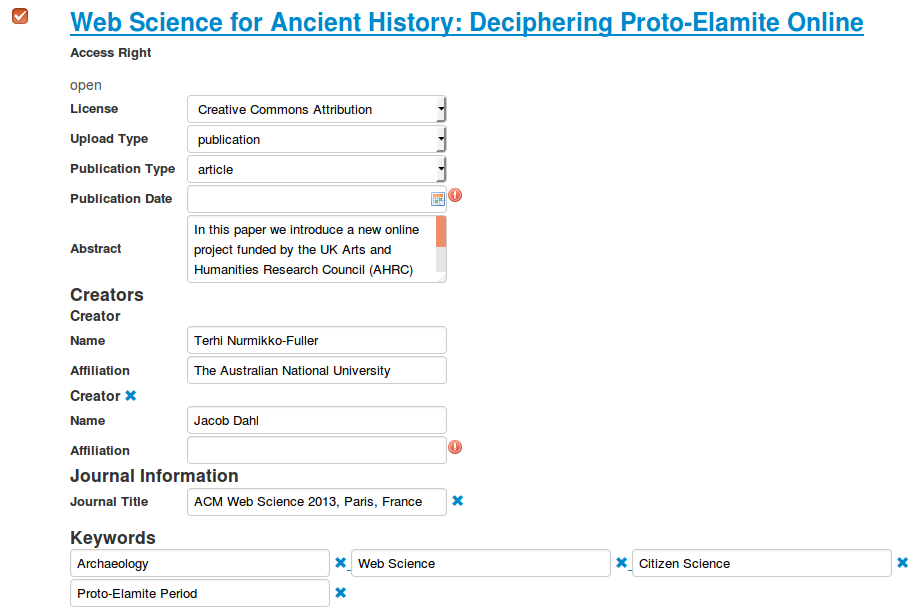Open Access, Academia.edu, and why I'm all-in on Zenodo.org
Note: The majority of this post and the migration framework (academia-migrate) were authored about a year ago, but placed on the back burner while other projects demanded my time. Between the revelation that Academia.edu has implemented banner ads on some profiles and Sarah Bond’s article in Forbes, I have been motivated to finally push this project into production.
Many scholars throughout the world use Academia.edu to broaden access to their own research, which includes not only published documents, but unpublished manuscripts or presentation materials (such as Powerpoint slideshows) that would otherwise never be submitted to peer-reviewed journals. Academia.edu bills itself as a “disruptive” service that takes a shot at the increased commercialization (and resulting access restrictions) of academic publication. For scholars that want their research to be made available to the widest possible audience, peer-reviewed journals are falling short. Peer review offers a certain cachet required by university administrators for considerations toward tenured professorship, but more and more journals are owned and distributed by fewer and fewer publishers. University libraries are strapped with increasing costs to subscribe to journals, and unaffiliated scholars are on the outside looking in with regard to access to current scholarship, unless they would like to pay as much as $50 to acquire a single article. Academia.edu has changed this somewhat. With HTML microdata and pathways for search robots to crawl full-text articles, researchers are able to find relevant articles through Google, and Google’s algorithms tend to favor Academia.edu over other harder-to-crawl sources.
On the surface, this seems great for scholars. And it was good in the beginning, but this has changed over the last year. Despite its domain name, Academia.edu is a commercial venture. It is beholden to investors, not the scholarly community it serves, nor universities, governments, or taxpayers. Recently, an Academia.edu developer approached a scholar about his willingness to participate in a pay-to-play system. I won’t go into great detail, as the initial exchange and subsequent outrage on Twitter have already been covered thoroughly. But what does paying for a recommendation mean? Aside from sacrificing a certain intellectual honestly, a recommendation essentially enhances visibility and access to your work. By definition, though, not paying for a recommendation thus reduces visibility and access to your work. If the Academia.edu developers alter the metadata provided to robots to improve search relevance for those that pay for their publications to be promoted, this necessarily reduces relevance for non-paying users. As a result, access declines, which reduces the likelihood of citation, and may even negatively impact administrative reviews of faculty output.
Furthermore, it appears that Academia.edu is now experimenting with banner advertisements. They do not yet appear to be a permanent fixture, but I believe we are seeing the beginning of overt attempts at generating income on top of research that scholars have published to the site in good faith that it is free and open.
So is there a solution?
Yes. It is Zenodo.org.
Zenodo.org is a truly open access scholarly publication framework that is capable of replacing Academia.edu. Zenodo is open to “research outputs from across all fields of science,” including the humanities and social sciences. Like Academia, users may upload journal articles, conference papers, posters, and presentations, but may also upload raw research data. Zenodo is developed by CERN, which has long demonstrated its devotion to open science and the web. It is backed by funding from the European Union. Moreover, Zenodo has a well-documented API for publishing and harvesting content via well-known open web standards. This is in stark contrast to Academia.edu, which goes to great lengths to prevent users from harvesting publication metadata and makes it impossible to download documents without registering for an account (which also inflates their userbase). Academia.edu prides itself in being disruptive, but it too needs to be disrupted.
Migrating from Academia.edu to Zenodo.org
I fully advocate leaving Academia.edu, but what purpose does it serve to simply delete your account? You are removing publications that are, in the very least, freely and openly available at the moment. Essentially, the best decision is to migrate documents to Zenodo.org, and allow at least one week for Google to fully index migrated content before deleting the Academia.edu account. My MA thesis entitled “Recent Advances in Roman Numismatics,” about the application of Linked Open Data methodologies toward Roman numismatics with Nomisma.org and Online Coins of the Roman Empire, had been available in both the ANS Digital Library and Academia.edu as of January 28, 2016. Due to our superior use of microdata and full-text indexing, the ANS Digital Library version surpassed Academia days after it was published. I uploaded my thesis to Zenodo.org January 29, 2016, and it was already on the first page of Google three days later.
Many of us have uploaded a substantial number of documents to Academia.edu, and it might be tedious to re-upload these documents into a new system, especially with regard to re-entering publication metadata. I have sought to rectify this by facilitating a more efficient migration system. I have developed a framework that is capable of parsing metadata from an Academia.edu profile (although not all publications are listed when the profile page loads), accepting re-uploaded documents (since these cannot be extracted from Academia.edu directly), and uploading these contents into Zenodo.org. This framework itself is open source and available on Github. I will save the technical discussion for different venue.

This system took about a week to develop, but I hope that this migration process might save each user several minutes per publication. I hope that this work will encourage more scholars to consider migrating to Zenodo.org from Academia. Migration ultimately enhances the value of these publications, as they can be harvested en masse by members of the general public, who might be able to use them for statistical analyses, to enhance them with named entity recognition or improved interlinking between publications (via Library of Congress Subject Headings, which are incorporated into Zenodo’s metadata entry system), or to simply read them without the obstacle of registering for an account. It is time to accept that the Academia.edu is seeking to shift the academic publishing paradigm from one commercial provider to another.




